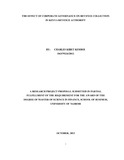| dc.description.abstract | The effects and contributions of corporate governance by organizations have been on a rise in
recent times KRA included. However, the anticipated end results are most often not realized due
to governance challenges which include political appointments of board members, inadequate
skill personnel in the board and integrity issues from employees.
Kenya Revenue Authority (KRA) embraced corporate governance as an enhancement of revenue
collection strategy since its inception. The general research objective was to establish the effect
of corporate governance on revenue collection. A case study of Kenya Revenue Authority was
conducted. Statistical Package for Social Scientists (SPSS) was used and Spearman Correlation
Coefficient and Multiple Regression Analysis to determine the magnitude of the relationship of
corporate governance and revenue collection.
The findings revealed that corporate governance variables namely; board size, had a negative
effect on revenue collection while board roles, board effectiveness and policy and decision
making had a significant positive relationship with revenue collection. Corporate Governance in
general had a significant positive relationship with revenue collection.
Corporate governance was found to have effect on 48.4% on revenue collection, thus desirable to
study further. | en_US |

